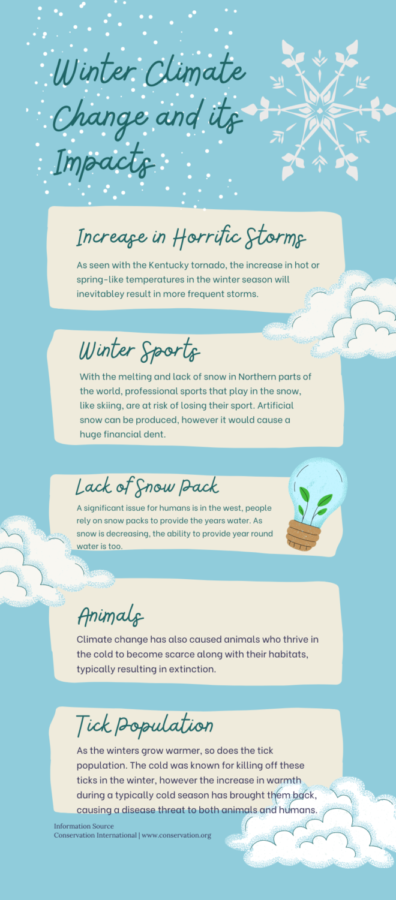Effects of Climate Change Often Overlooked in Winter Months
When we think about climate change, we often think of how rising temperatures affect the summer months but the effects of climate change during the winter season are also important to understand.
As a result of climate change, winters now have higher temperatures and less time. According to The Brink, in the northeast, winters have actually been warming three times as fast as summers have, eliminating well-known harsh winters which diminish warmth.
Climate change has also caused animals who thrive in the cold to now become scarce, along with their habitats, resulting in near extinction.
“A big issue [for humans] is out west they rely on snow packs to provide winter drinking water for the rest of the year,” biology teacher Jeff Grandin said.“A lot of places are not getting that winter snowpack.”
Additionally, winter sports that rely on snow could potentially go out of business unless artificial snow is produced. Although it is beneficial, artificial snow costs 2.6 billion dollars and therefore is not practical. Climate related disasters have already cost the world 650 billion dollars, making a significant dent in the financial department, according to the Washington Post.
“Climate change has had a significant impact on our economy,” said freshman Asnakech Uhl.“Wildfires and other disturbances have resulted in property destruction, resulting in financial consequences.”
The Kentucky tornado that started on Dec. 10th resulted in immense deconstruction of houses, costing families thousands. In addition, the tornado killed nearly 74 people, as they are still searching for bodies. As the planet warms in the winter, intense storms like these become more and more frequent.
Furthermore, as the warm winters grow, so does the growth of the tick population. Ticks carry many diseases threatening both humans and animals, causing a huge risk to anyone who steps outside.
Although both winter and summer climate changes cause major concerns, they are equally important and both require the same effort of action.
“I don’t think there is one over the other,” Grandin said, “They are equally concerning. Both times have major impacts.”
Ultimately, the cold seasons are warming faster than the warm seasons, causing a need for immediate change and large reaction from the public.
“There are numerous little steps that can be taken to contribute in the protection of our environment,” Uhl stated. “Recycling and composting everything you can, and using rooftop solar panels are larger measures to be taken.”
If action isn’t taken immediately, animals that thrive in cold regions will continue to disappear along with the cold temperatures.
“Climate change is increasing rapidly and if we don’t do anything about it, then our Earth will never recover,” freshman Camila Sanchez stated.













